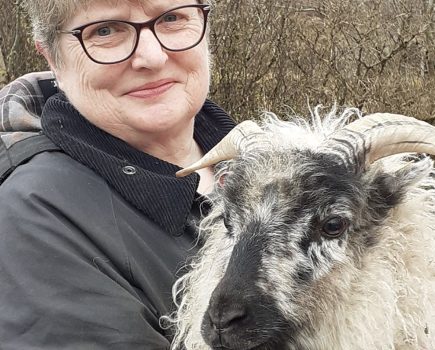What could be better than going out into your garden and harvesting fresh vegetables to cook for your supper?
What could be better than going out into your garden and harvesting fresh vegetables to cook for your supper? How about some nice fat leeks, some nutritious carrots, a few potatoes and maybe winter salads from the polytunnel? No need to drive to a busy supermarket, where the veg may have been force grown with lots of chemicals, then travelled halfway round the country and ended up packaged in plastic. How much more satisfying, healthy, eco-friendly – and cheaper – to grow it yourself!
If you are lucky … If you buy a smallholding, you may be lucky and find you already have a kitchen garden, and it could be just a matter of reclaiming beds, weeding and planting. It’s more likely, though, that you will have to start from scratch, tackling ground that’s covered in weeds or grass. There will be plenty to keep you busy, planning the kitchen garden, preparing the ground, maybe constructing raised beds, then planning the vegetables and herbs you want to grow. Perhaps you will want to think about soft fruit as well, and dream of having your own delicious raspberries and strawberries. And then there’s top fruit to consider – some unusual varieties of apple, perhaps. A lot will depend on how much space you have. You will be looking at the overall picture. The extent of your kitchen garden may be determined by what livestock you want to keep, where they will go and how much land they need. You may also want to reserve space for ornamental beds. A large kitchen garden area with soft fruit and a mini orchard could easily take up half an acre. It will be a big demand on your time, especially in the summer months. Starting costs can also build up if you have to buy tools and equipment, seeds and plants. But once it’s up and running, the ongoing growing costs will be low. Argument for going organic Why should you go organic, and avoid fertilisers, pesticides, fungicides and herbicides? Organic organisations argue that organic production reduces health risks, is better for our water resources, builds healthy soil, works in harmony with nature and helps preserve diversity. Organic growers would also say that their the food tastes better and that organic agriculture can be a lifeline for small growing operations. To produce organic products to sell, you will need to be registered with a certified body such as the Soil Association. If the costs of registration are not justifiable on a small scale, you can still sell produce at the farm gate or a farmer’s market. Principles of permaculture You may want to consider the deeper picture when planning your smallholding. This may be influenced by your philosophy. Do you subscribe to the Gaia view, that the planet is a living organism, with all things – including human beings – connected and inter-dependent? If so, permaculture may be your thing. Permaculture is the conscious design and maintenance of agriculturally productive systems which have the diversity, stability and resilience of natural ecosystems. It’s the harmonious integration of the landscape with people, providing their food, energy, shelter and their other non-material needs in a sustainable way. The philosophy is ever more appropriate as it becomes increasingly obvious that the planetary environment is being destroyed by over-consumption and a lack of care for the natural world. Permaculture simply asks people to put as much into life as they demand from it. In short, it’s a way of arranging your whole life to be happy and abundant, and meeting your own needs without making anyone else’s life unpleasant. Creating some great compost If you’re in tune with the principles of permaculture, you will want to create some decent compost bins. Composting reduces your personal volume of rubbish, conserves water, increases plant growth, replaces the need for toxic chemical fertilisers and pesticides… and is also fun! About a third of the average dustbin load is made up or organic material that could be composted, and composting is probably the single most effective action you can personally take to help the planet. A great guide is Backyard Composting by John Roulac. To find out more To find out about going organic visit www.gardenorganic.co.uk To find out more about permaculture try The Permaculture Way by Graham Bell (available from Amazon) or visit www.permaculture.org.uk







